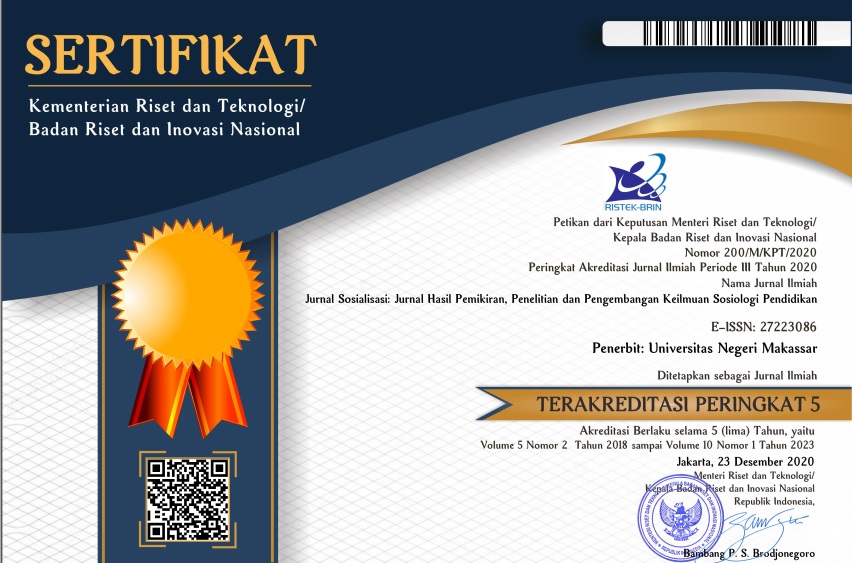DOMESTIC VIOLENCE AGAINST WOMEN IN NIGERIA: A PHILOSOPHICAL STUDY
(1) Nnamdi Azikiwe University
(*) Corresponding Author
DOI: https://doi.org/10.26858/sosialisasi.v0i3.19960
Abstract
Keywords
Full Text:
PDFReferences
Anweting, K. I., & Ogar, O. A. (2018). Political Violence in Nigeria and Its Implication for National Development. GNOSI: An Interdisciplinary Journal of Human Theory and Praxis, 1(1), 84-92.
Campo, M. (2015). Domestic and family violence in pregnancy and early parenthood: Overview and emerging interventions. In Australian Institute of Family Studies. https://aifs.gov.au/cfca/sites/default/files/publication-documents/cfca-resource-dv-pregnancy.pdf
Coomaraswamy, R. (1994). Rapporteur on violence against women appointed. In WIN News (Vol. 20, Issue 3).
Ezejiofor, A. (2011). Patriarchy, Marriage and the Rights of Widows in Nigeria. UJAH: Unizik Journal of Arts and Humanities, 12(1). https://doi.org/10.4314/ujah.v12i1.9
Gibson, S. (1993). On sex, horror and human rights. Women, 4(3), 250–260. https://doi.org/10.1080/09574049308578167
IAU General Assembly. (2006). IAU 2006 General Assembly: Resolutions 5 and 6. System, 5–6.
Ibok, A. K., & Ogar, O. T. (2018). Traditional Roles of African Women in Peace Making and Peace Building: An Evaluation. GNOSI: An Interdisciplinary Journal of Human Theory and Praxis, 1(1), 41-58.
Indu, P. S., Anilkumar, T. V., Pisharody, R., Russell, P. S. S., Raju, D., Sarma, P. S., Remadevi, S., Amma, K. R. L., Sheelamoni, A., & Andrade, C. (2017). Prevalence of depression and past suicide attempt in primary care. Asian Journal of Psychiatry, 27, 48–52. https://doi.org/10.1016/j.ajp.2017.02.008
Ishola, S. A. (2016). Domestic Violence: The Nigerian Experience. Asia-Africa Journal of Mission and Ministry, 13, 3–16. https://doi.org/10.21806/aamm.2016.13.01
Kamal, I. (2018). Gender Inequality and Violence against Women. Open Access Journal of Biomedical Engineering and Biosciences, 2(4). https://doi.org/10.32474/oajbeb.2018.02.000142
Khan, A. R., & Ratele, K. (2020). Assessing the Policy Implementation of the Bangladeshi Domestic Violence Act: Any Lessons for Protecting South African Women in their Homes? South African Review of Sociology. https://doi.org/10.1080/21528586.2020.1741443
Mandara, M. U. (2004). Female genital mutilation in Nigeria. International Journal of Gynecology and Obstetrics, 84(3), 291–298. https://doi.org/10.1016/j.ijgo.2003.06.001
Mberu, B. U. (2007). Household structure and living conditions in Nigeria. In Journal of Marriage and Family (Vol. 69, Issue 2, pp. 513–527). https://doi.org/10.1111/j.1741-3737.2007.00380.x
McCann, I. L., & Pearlman, L. A. (2015). Psychological trauma and adult survivor theory: Therapy and transformation. In Psychological Trauma and Adult Survivor Theory: Therapy and Transformation. https://doi.org/10.4324/9781315803715
Milazzo, A., & Walle, D. van de. (2019). Nutrition, Religion and Widowhood in Nigeria. Economic Development and Cultural Change. https://doi.org/10.1086/704159
Ngozi, C., Iyioha, I., & Durojaye, E. T. (2018). The Violence Against Persons Prohibition Act, the Maputo Protocol and the Rights of Women in Nigeria. Statute Law Review, 39(3), 337–347. https://doi.org/10.1093/slr/hmx009
Nigam, S. (2019). Legislating the laws relating to domestic violence. In Women and Domestic Violence Law in India (pp. 48–89). https://doi.org/10.4324/9780429343575-3
Omideyi, A. K. (1983). Age at marriage and marital fertility in Eastern Nigeria. Genus, 39(1-4), 141–154.
Orji, E. O., Kuti, O., & Fasubaa, O. B. (2002). Impact of infertility on marital life in Nigeria. International Journal of Gynecology and Obstetrics, 79(1), 61–62. https://doi.org/10.1016/S0020-7292(02)00180-7
Peter, E., & Chinyere, A. (2015). Gender inequality in reproductive health services and sustainable development in Nigeria: A theoretical analysis. International Journal of Sociology and Anthropology, 7(2), 46–53. https://doi.org/10.5897/ijsa2014.0577
Skovlund, C. W., Mørch, L. S., Kessing, L. V., Lange, T., & Lidegaard, J. (2018). Association of hormonal contraception with suicide attempts and suicides. American Journal of Psychiatry, 175(4), 336–342. https://doi.org/10.1176/appi.ajp.2017.17060616
Smith, D. J. (2016). Modern Marriage, Masculinity, and Intimate Partner Violence in Nigeria. In Marital Rape (pp. 41–54). https://doi.org/10.1093/acprof:oso/9780190238360.003.0004
United Nations. (2007). Women, gender equality and sport. Women2000 and beyond, December, 1–40.
Vawda, N. B. M. (2018). Suicide attempts during pregnancy in South Africa. In South African Journal of Psychiatry (Vol. 24, Issue 1). https://doi.org/10.4102/sajpsychiatry.v24i0.1154
Umukoro, G. M., & Egbai, M. J. (2016). Gender Mainstreaming, A Panacea For Quality Service And Good Governance: An Insight Into The Political Systems In Francophone Africa. Global Journal of Applied, Management and Social Sciences, 11.
Yta, E. M., Umukoro, G. M., & Ekpe, M. E. (2020). Increasing Community discourse and Action on GBV prevention in Akai Effa and Idundu, Cross River State. PINISI Discretion Review, 4(1), 123-134.
Article Metrics
Abstract view : 578 times | PDF view : 127 timesRefbacks
- There are currently no refbacks.

This work is licensed under a Creative Commons Attribution 4.0 International License.


































